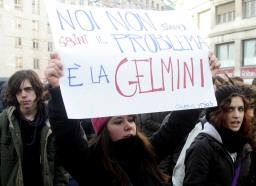The Senate on Friday greenlighted a government decree designed to promote meritocracy in Italy's higher education system and overhaul the employment of university staff.
The decree, which Education Minister Mariastella Gelmini describes as ''the first step towards the revolution of a paralysed system'', forms part of a wider programme of cost-cutting reforms for the sector that have yet to be finalised.
Among the measures introduced in the decree, senators have added an amendment that will prevent university professors from resting on their laurels thanks to the creation of a national publications database to be updated annually.
Professors and researchers will only receive biannual boosts to their salaries if they can prove they have undertaken research, while if there is no trace of a new publication in two years they will be excluded from panels recruiting new staff and their bonuses will be halved.
Another amendment will allow universities to invite academics working abroad to fill posts in an effort to slow the brain drain, which has seen Italians leave the country for better-financed research projects and improved career prospects elsewhere.
The decree will also permit universities to take on one new researcher for every two researchers whose contracts expire between 2009 and 2011, relaxing a restriction in the summer budget blueprint that would have reduced numbers to one for every five.
In a bid to help out people at the start of their careers, 60% of funds must be spend on the employment of young researchers.
The perception of widespread corruption in the university recruitment process will meanwhile be addressed by new rules on interviewing panels, which must include one professor from the university department taking on new staff and up to four professors from other universities.
The decree also increases funding for research studentships by 135 million euros from next year.
In addition, 7% of government funds allocated to universities (eventually rising to 30%) will be shared out on a performance basis from 2009, rewarding universities which demonstrate excellence in teaching and research.
The decree, which now passes to the House, has been welcomed by some university bodies including the Conference of Italian University Chancellors and heads of research institutes.
But critics have downplayed the usefulness of the decree in the light of government spending cuts of 1.5 billion euros planned from 2010.
Students on Friday continued to protest Gelmini's wider plans for reform, tipped to include a reduction in the number of courses offered and the closure of some outlying university branches with low student attendance.
Around 200 students burst into the rectorate of Rome's Sapienza University to disrupt the inauguration of the new academic year, shouting ''there's nothing to inaugurate'', while around 100 students protested outside Premier Silvio Berlusconi's Rome residence, Palazzo Grazioli.
Students and professors have been protesting the reforms across the country since October, while organisers claimed around 500,000 people turned up to a national rally in Rome on November 14.









